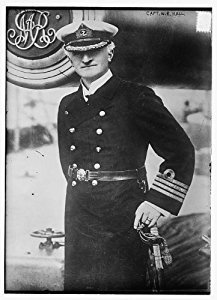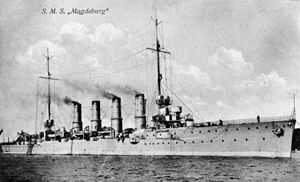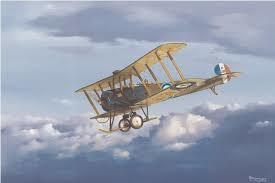Shaun Lewis's Blog, page 3
April 30, 2019
How the Gallipoli campaign might have been avoided for £4M
We have recently commemorated ANZAC Day. In 1915, Australian and New Zealand soldiers participated in an expedition to capture the Gallipoli Peninsular so that the Dardanelles Strait would be open to allied navies to open a southern front and knock Turkey out of the First World War. It might have been avoided had a mere naval captain succeeded in his plan to bribe Turkey to sever its alliance with Germany.Captain Reginald 'Blinker' Hall was the newly appointed Director of Naval Intelligence. Through his intelligence agents and intelligence gained by cracking Germany's signal codes, he deduced that the newly established alliance between Turkey and Germany was fragile. In January 1915, he instigated discussions with the Turkish Minister of the Interior to break off the alliance, hand over the German cruisers given to them as a gift the previous August and to clear all mines and open up the Dardanelles to allied shipping in support of the Russians in the Black Sea. A team of two British businessmen and a former diplomat were instructed to offer the bribe of £3M and given authority to increase the figure to £4M, if necessary. Hall took this action without any consultation with the Cabinet, but did keep Churchill informed, although not the price he was prepared to offer. The negotiations took place over two months, using at one point the Turkish Chief Rabbi as an intermediary. When the First Sea Lord, Lord Fisher, learned of the plan, he ordered Hall, with Churchill's agreement, to break off the discussions as he felt confident the Allied Fleet would force a passage through the Strait. When this failed, Hall was instructed to resume negotiations, but they proved fruitless. The Turks had insisted that they could retain Constantinople after the war, but unbeknown to Hall and the Admiralty, the Foreign Office had made a secret deal with the Russians that they would take possession of the city after the war. Hall was later carpeted by the Cabinet for his unauthorised offer, but had his plan come to fruition, it would have saved far more than £4M in treasure and several thousand lives.I draw attention to Hall's achievements in a number of my WW1 novels, but I suspect some of my readers consider the successes of the Admiralty's intelligence division as too far fetched!

Published on April 30, 2019 04:37
April 23, 2019
Another submarine salty dit – or how my mother learned I had grown a beard
In submarines it is quite common not to shave when on patrol. This is a throw- back to the days when the Royal Navy operated conventional submarines and fresh water was in short supply. Accordingly, on my first submarine patrol, I stopped shaving and sported a full set.This patrol was a top secret, intelligence gathering mission in the South Atlantic. However, every four weeks or so, we approached the Falkland Islands to meet with the General commanding the islands to exchange intelligence. The General would be brought out to us by helicopter at first light as it was dark enough to maintain our clandestine posture, but light enough for the helicopter pilot to see the horizon for the winch transfer to our submarine casing. On such occasions, I was usually the officer of the watch on the bridge controlling the transfer. As soon as the transfer was over, we would dive in order to avoid prying eyes. We prided ourselves on our slickness in being on the surface for the minimum time.It was with some surprise, therefore, that I received a letter a few weeks later from my mother, complaining about the distortion of my youthful looks by the fungus of hair on my face. I had not told her, so how on earth did she know?It later transpired that one of our ‘top secret’ helicopter transfers had been captured by a film crew in the back of the helicopter and featured on News on Ten. We learned that our operations had been too clandestine and the MOD was worried that the Argentinians might venture another attack on the Falklands. By deliberately leaking details of our presence in such a visual form, the MOD hoped that the Argentinian Naval Attaché in London would brief his lords and masters that there really was a submarine lurking in the South Atlantic. It demonstrates that submarines are not always the best instrument for gunboat diplomacy.

Published on April 23, 2019 04:23
April 15, 2019
Confessions of a Chinese interpreter
In the late 1980s, I completed my Mandarin interpreter training in Hong Kong and the night before I was due to fly home, I was summoned to report to the MOD on arrival in the UK.I duly reported to the relevant MOD department and was told, ‘Thou shalt not proceed on your leave as planned. You are to be the host interpreter for the most senior military delegation ever to visit these isles!’ This was despite the fact that since my examination results were still pending, I was not a qualified interpreter. I might add that I had only had two weeks’ leave in the previous two years, so had looked forward to some relaxation.To protect the innocent I shall name no names. Let us just call the host officer General K and his wife, Lady K. One evening, I was assigned to act as interpreter at a dinner at the Honourable Artillery Club. I was to sit behind and between Lady K and the head of the Chinese delegation, General H. General H was what was termed ‘a peasant general’. He had risen through the ranks to become China’s youngest ever divisional commander. I had already discovered that he had no interest in culture whilst accompanying him to a concert and a tour of an historic house. I should add, that I was a little peeved, too, that no arrangements had been made to offer me anything to eat prior to interpreting at the dinner. Lady K had wound me up by teasing me for being hungry and suggesting she should throw me one of her bread rolls. That might have influenced what happened next!At some point she said to General H, ‘I’m so interested in China. It’s been a special topic of interest to me ever since I was given a very beautiful mother-of-pearl inlaid jewellery box.’I didn’t think the general would find that terribly riveting and, moreover, I didn’t know how to translate, ‘mother-of-pearl inlaid’. Instead, I translated, ‘Lady K likes football. She wondered if you did?’The general almost choked on his food and replied, ‘Are you sure she said “football”?’‘Of course, sir,’ I replied confidently.‘Well,’ he said with more animation that he had shown all evening. ‘I do like football and admire Manchester United.’I translated to Lady K, ‘The general finds that very interesting and would love to know more about your box.’Lady K was delighted and went off into infinite detail about her jewellery box. My reply to the general was, ‘Lady K supports Chelsea.’ I could see Lady K looking surprised by how short my reply was, so I had to continue, ‘Of course, Manchester United is a very popular side in this country, too, but lady K is from London and that has influenced her choice of team.’By then I had realised the error of my ways. I was now committed to making up two entirely fictitious conversations of equal length to those actually taking place, but I could not back out now. The next few minutes of conversation filled me with terror lest I be caught out. Fortunately, Lady K moved onto a more mundane subject and I was spared potential branding and dismissal from the Service. However, I often wonder if General H went back to China rather impressed that Lady K was not stuffy and had turned out to be such an avid fan of football.

Published on April 15, 2019 04:29
April 8, 2019
Another dodgy moment in submarines
Following the popularity of my post last week, I am bowing to demand by dredging up other tales from my memory banks about the more interesting events during my time in submarines. Whilst most are too highly classified to repeat, I can think of a few more, but not all equally as dramatic.I recall some excitement in my first four weeks at sea in a nuclear submarine. I had joined her as a trainee in dock a few months earlier. Following the docking period we had to go through what is known in the RN as ‘work-up’. Over a four-week period, we had several members of the submarine operational sea training staff on board, putting us through our paces, including safety and tactical drills.On one particular day I was the Ship Control Officer of the Watch, ie responsible for the manoeuvring and trim of the submarine. Firstly, the inspection staff made us ‘scram’ the reactor, meaning we had to shut it down and operate on battery power. Then they set off some smoke to simulate a fire whilst dived. I had to bring the submarine to periscope depth so that we could ‘snort’, ie put up a mast to suck in air to ventilate the submarine and charge the batteries on the diesel engines. Due to the smoke, we were all wearing emergency breathing apparatus, so all orders were muffled. Just for good measure, the staff then shut down half our electrical power so that we had to control the after planes using compressed air instead of electrical power. This made it much more challenging for the ‘planes operators to keep depth. This was all going well except that without that 50% of electrical power, I could not operate the trim pump to pump out water, so we were ‘heavy’. Moreover, the electro-hydrolysis plant was still working, converting sea water into oxygen and fresh water. I desperately needed to pump out the brine residue as the submarine was becoming yet heavier, but without the power to the pump, I could not do so. As a result, we had to apply more and more ‘rise’ on the ‘planes to remain at periscope depth, taking on a steeper angel, in the same way as a pilot raises the nose of an aircraft to gain height. Unfortunately, after some time of such fun and games, the angle on the submarine was so severe that one of the after trim tanks vented and, through a design fault, it vented directly over the switchboard. Consequently, the switchboard shorted and we lost all our remaining electrics. The submarine began sinking backwards and, as we headed for the bottom, we had to shut down the snort induction system. The captain responded by ordering me to apply more speed, but it made no difference. We kept sinking. Then he ordered ‘full ahead’, an emergency order and blew main ballast to surface in emergency. When the propeller was barely fifty feet from the bottom, the submarine at last began to respond and we headed for the surface.Several years later, I met up with my former captain again at the Army’s Staff College. He took great delight in regaling the tale to my fellow officers and told everyone how impressed and amazed he had been that, even though a trainee, I had acted so calmly throughout this dangerous time. What he never understood was that, as a trainee, I had no idea matters were so dodgy. I had thought this was normal life in submarines! Sometimes ignorance is bliss.

Published on April 08, 2019 02:46
April 1, 2019
Dodgy moments in submarines ... and the changing density of sea water
During my days in submarines, I and several others spent far too much time down near the Falkland Islands for our liking. This was in the early 1980s, when we were conducting ‘back to back’ patrols of thirteen weeks or more down there. The tedium was broken up by many moments of excitement, most of which are too highly classified to be shared in an open forum. However, one moment of excitement I can share, and which is described in my novel, The Custom of the Trade, was the fun and games in trying to return to periscope depth (PD) when in the equatorial region.The sea at the Equator is constantly heated by the sun. As a result, the top 120 feet or so of water is at a much higher temperature than that at lower depths. This makes the water less dense and a noticeable barrier forms between this warm water and the denser water below. Something similar occurs in both the Dardanelles and the Baltic due to the amount of fresh water pouring into the denser saline sea.On my first patrol ‘down south’, I was responsible for manoeuvring the submarine to PD. I went through the usual routine of giving the submarine ten degrees of bow up angle, increasing speed and pumping out 400 gallons of water. However, we were heavily laden with a full war complement of torpedoes and missiles, and all the food necessary to feed us for three months. To everyone’s surprise, the submarine became stuck at about 120 feet. Like Richard Miller in my novels, our CO worked out the reason and ordered us deep again to prepare for a second attempt. I prepared for it by pumping out a total of 2,000 gallons of water. The CO then ordered twenty degrees of bow up angle and 50% more revolutions for the next attempt. As soon as we reached 150 feet, I then had to start flooding 2,000 gallons of water quickly back into the submarine, take off the bow up angle and reduce the speed for fear that we might accidentally surface. It all went to make a normally routine evolution into something exciting. We soon adapted to and mastered the new routine, but on the return from my last South Atlantic patrol, something more life-threatening was to occur.As so often happened in our elderly submarine, we had an engineering defect. The senior engineering officer advised the captain that we would need to shut down the reactor to repair the defect. This would mean that we would be reliant on the battery for all power and, thus, the power-hungry air conditioning would not be available. Accordingly, the engineer persuaded the captain that we should conduct the repair dived, in the cooler water of the deep instead of on the surface. Even so, the temperature rose steadily to unbearable levels in the engineering compartments, in the after section of the submarine. Some of the engineers fainted and had to be dragged forward, to the cooler part of the submarine, to revive. The repair went on for longer than expected and the battery power was draining fast, to the extent that unless the defect was fixed quickly, we would not have enough power to restart the reactor. With no power from the reactor to purify the air, like the submariners in my books, we all began to suffer headaches from carbon dioxide levels 100 times those normal. The captain ordered all non-essential personnel to retire to our bunks to conserve oxygen.Clearly, I was destined to become a writer even then. A young officer, I had too much imagination for my own good. I realised that the situation was becoming desperate. Without the precious reactor, we had insufficient power to reach the surface and the air was deteriorating. I imagined the submarine as a floating tomb several hundred feet beneath the surface like some form of underwater Flying Dutchman. I remember that I was not afraid to die, but I just accepted it as my lot. As submariners, we knew the risks and dealt with them. However, I regretted nobody would ever know what had happened. It wasn’t something one discussed with one’s fellow officers. That would have been un-British and ‘un-officer like’. Like them, I turned into my bunk and went to sleep, never expecting to wake up!A few hours later, I suddenly awoke on account of a strange noise. It slowly dawned on me that it was the noise of the diesel engines starting. That meant we had to be at PD or on the surface. I felt the draught of fresh air and smelt the stench of sea water, and worked out that I was not just alive, but we were on the surface. It transpired that our gallant engineers had finally fixed the defect and managed to restart the reactor. The captain had then taken us back to the surface to re-charge the batteries. Like cats, submariners have nine lives and we had just used another.

Published on April 01, 2019 03:36
March 25, 2019
How did the German light cruiser, SMS Magdeburg, help Britain win WW1?
Who would have thought that a torpedo test ship would have such an impact on the conduct of the First World War? On 2 August 1914, the SMS Magdeburg, a German light cruiser, opened fire on the port of Libau in Latvia (now Liepaja), the first shots of the war against Russia. However, it was not until later in the month that her place in history would become more significant.On 26 August, whilst steaming off Estonia, she ran aground and could not be freed. Two Russian cruisers appeared and seized not just the ship, but three intact copies of her code books. One of these was handed over to the Royal Navy on 13 October 1914.The code book was the first of three different signal books the RN was to obtain by the end of 1914 for its new signals intelligence and decryption facility established in Room 40 of the Old Admiralty Building in late 1914.With some far-sighted planning, the Admiralty ordered the German telegraph cables in the North Sea to be cut on the outbreak of war. As a result, the Germans were almost completely dependent on wireless transmissions to communicate with their ships and embassies. Britain had already begun establishing a series of wireless listening stations along the East coast prior to the outbreak of the war. With the three key codebooks, and some inspired and skilled crypto-analysis work, Room 40 soon became able to read much of the Germans’ signal and telegraphic communications, an ability that offered Britain huge strategic and operational advantages. Personnel from Room 40 went on to work at Bletchley Park during WW2.

Published on March 25, 2019 03:13
March 21, 2019
John Buchan - Author of 'The 39 Steps'
Yesterday, I was very privileged to visit the village of Elsfield in Oxfordshire, where the author John Buchan once lived and his ashes are now buried in the local churchyard. Buchan was the author of the famous novel, The Thirty Nine Steps, which has been turned into four films. The novel is about German espionage in Britain just prior to WW1. He later wrote the novel, Greenmantle, about a German plot to foment a jihad, or Holy War, against the British Empire during WW1. The novel is based on a true story. Like many writers of the time, Buchan was employed by the Secret Intelligence Service.I am flattered to say that several people, including a literary consultant, have compared my latest novel, Now the Darkness Gathers, very favourably with the works of John Buchan. My novel, too, is based on the true story of the German plot in Persia to turn the Moslem and Hindu world against the British in order to divert troops from the Western front to the Middle East and Indian sub-continent. I am proud to have my name linked with such a distinguished writer. For an accurate and true account of the plot, I recommend Peter Hopkirk’s, Like Hidden Fire.

Published on March 21, 2019 05:54
March 11, 2019
A German plot to blow up the Bank of England
A namesake of mine was the German Intelligence Service's spymaster in Britain during the period leading up to the outbreak of WW1. W Lewis's real name was Gustav Steinhauer, the head of the British section of the German Admiralty's intelligence service, the Nachrichten-Abteilung or ‘N’ division. He had many other aliases, including the one to which I refer in my novel, Now the Darkness Gathers, Mrs Reimers. He was a German naval officer who had been trained by the Pinkerton Detective Agency for his intelligence duties and he spoke fluent English.Steinhauer was well known to the British counter-intelligence service, the Home Section of the fledgling Secret Service Bureau (now MI5), as he had co-operated closely with Special Branch during Queen Victoria's funeral to help foil an attempt by Russian anarchists to assassinate the Kaiser. It was in response to many scare stories of dastardly deeds being plotted by the Germans against Britain, largely stirred up by The Daily Mail and the novelists William Le Queux and Erskine Childers, that the SSB was established in 1909. However, it was not until 1911 that 'N' division began seriously to establish a spy network in Britain. The German Navy's intelligence service was a tenth of the size of that of the army and its focus was on France and Belgium. Steinhauer travelled extensively in Europe, but rarely visited Britain. Instead, he communicated with his agents through a number of intermediaries, mainly German barbers in London. Unfortunately for him, Special Branch had tailed him to one of these barbers' shops during his visit for Queen Victoria's funeral and, henceforth, monitored mail passing through the barber's shop. He did, however, visit Britain immediately prior to the outbreak of WW1, but the SSB had too few men available to mount a full surveillance operation on him. Even so, a few weeks later it was able to round up the entire German spy ring very swiftly. In my novel, I describe a fictional account to destroy the naval magazines in Kent. In actual fact, the Germans planned to blow up the Bank of England. Had the plot not been uncovered and then been executed, it would have destroyed Britain's economic ability to prosecute the war and changed history. An historian has suggested that this plot was the inspiration for Ian Fleming's book, Goldfinger. Like Ian Fleming, 'Everything I write has a precedent in truth.'

Published on March 11, 2019 04:59
March 4, 2019
I begin my fourth novel
My third book, The Wings of the Wind, is with my publisher for scrutiny. Whilst I await my fate, I have begun work on my fourth novel, about the Royal Navy's submarine flotilla in the Baltic. There, a squadron of nine submarines worked with the Russian Navy to disrupt the supply of Swedish iron ore to the Germans. The presence of such a potent force denied the Baltic to the German Navy as a sea training area.The work of the submarine flotilla was severely hampered by the Russian Revolution in late 1917. My tale will tell not just the daring deeds of the submariners battling the ice and Germans, but the incredibly difficult situation they faced once Russia withdrew from the war and the Germans were able to occupy Estonia and Finland. It is a story of adventure, heroism, espionage, political intrigue and finally, murder.

Published on March 04, 2019 07:03
February 27, 2019
My Third Novel - The Wings of the Wind
I am delighted to announce that I have just submitted my third novel to my publisher. Part of my For Those in Peril series, this story tells the story of the early days of naval aviation, the early actions of the Royal Naval Air Service (RNAS) and the activities of the RNAS Armoured Car Squadron and Royal Naval Division.Paul Miller is the third son of William Miller VC, a director of the navy's Intelligence Department who features in both the previous novels. An irresponsible, womanising, prankster, forever in debt, Paul's wayward ways continually bring him into conflict with his father's high moral standards. He is recruited into the RNAS by Wing Commander Charles Samson, one of the navy's pioneering aviators. Just as WW1 breaks out, Paul is still grounded from an earlier flying accident, but he is offered a chance to go to France as a member of Samson’s hastily formed RNAS Armoured Car Squadron. The cars are quickly in action against German cavalry and cyclists ravaging the Belgian and Northern French countryside. There and over Germany, his life and death exploits, on the ground and in the air, set him on the path to reform, but is it a path he will follow in earnest?

Published on February 27, 2019 03:16



